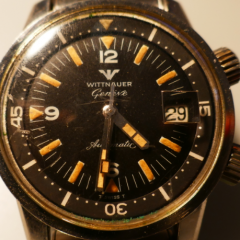Lubricants Basics
-
Recently Browsing
- No registered users viewing this page.
-
Topics
-
Posts
-
By LittleWatchShop · Posted
The term "digital transistor" is not a term of art--at least in the modern world. A lifetime ago, there was such a thing as DTL (Diode Transistor Logic). Resistors were involved, but I am not aware that they were ever integrated into the transistor package. -
By ManSkirtBrew · Posted
Update: I posted over on NAWCC and it looks like I melted the fine coil wires where they come into the solder lugs. After dropping the heat way down on my iron and being absurdly careful, I have a humming fork! -
Hell0 @nevenbekriev. Thank you for your advice. I have removed the old setting using my staking set--I will keep the KIF spring, since it is still good. I am awaiting the replacement setting, and will update when I do that. In the mean time, I looked at the escape wheel and it looks ok. What do you think?
-
By Hawaiikook808 · Posted
Aloha All, I recently bought this Seitz tool on eBay, but it is missing some pushers reamers. I ended up ordering new parts for those that were missing before I received the actual Seitz tool (bad idea). Upon inspecting the pushers/bits, I noticed 23 of the 56 provided with the set had no numbers. Further inspection revealed a huge difference in the quality of those unnumbered. Do all Seitz pushers/bits have a number on them? I'm pretty sure that 33 of the 56 I received are cheap Chinese knockoffs. The worst part is that I ordered $80 of parts to replace the missing pushers/bits, and now I'm looking to return the tool. I'm not crazy, right? If these are Seitz parts, they should all be numbered, correct? The first two pictures are the Seitz (numbered), and the other pictures are the suspect parts. Will I even be able to get a refund? Thanks, Frank -
By luiazazrambo · Posted
It was £10 + min fee, total £16, could not leave it there. Its a Stanton A.D.2. http://stanton-instruments.co.uk/
-







Recommended Posts